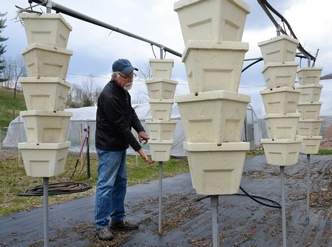
Terry Hudson adjusts his vertical growing system on his micro farm in Big Chimney. The system allows him to grow 200 plants and helps him maximize his small space.
CHARLESTON, W.Va. — When Terry Hudson bought his Big Chimney property in 2000, the only living thing on it was the overgrown grass. The small space nestled between two hills and a creek served as a junkyard, spotted with old delivery trucks and metal debris.
Today, Hudson’s land is home to a micro farm, part of a growing trend into of farm-to-table food systems that’s sweeping through West Virginia.
“Charleston is a growing market for local foods,” said Kelly Crane, an outreach coordinator with the West Virginia Food and Farm Coalition. “The hole in the supply and demand is on the supply side. I think people are interested in learning the production side so they can meet these really obvious market gaps.”
Crane also works with the West Virginia University Extension Service office in Kanawha City, which connects local residents with farming resources.
“West Virginians communities have a really strong sense of community,” Crane said. “So something like a local foods economy that directly builds community connections and local economies is something that really resonates with West Virginians.”
Crane and Hudson capitalized on their own connection and formed a Kanawha Valley Community Supported Agriculture food co-op, which connects producers and consumers through a subscription program. People who subscribe to the CSA receive a share of the goods produced at Hudson’s farm.
Last year they had 25 subscribers. This year they’re selling 50 shares. They’ve also expanded enough to hire one more worker at Hudson’s farm.
“Last year the demand was so high I put one post on Facebook and all 25 shares were sold in 48 hours,” Crane said.
With two high tunnels, vertical growing systems and raised soil beds without frames (known as hugelkultur beds) filling the less than two-acer space, there are no signs left of the junkyard…






